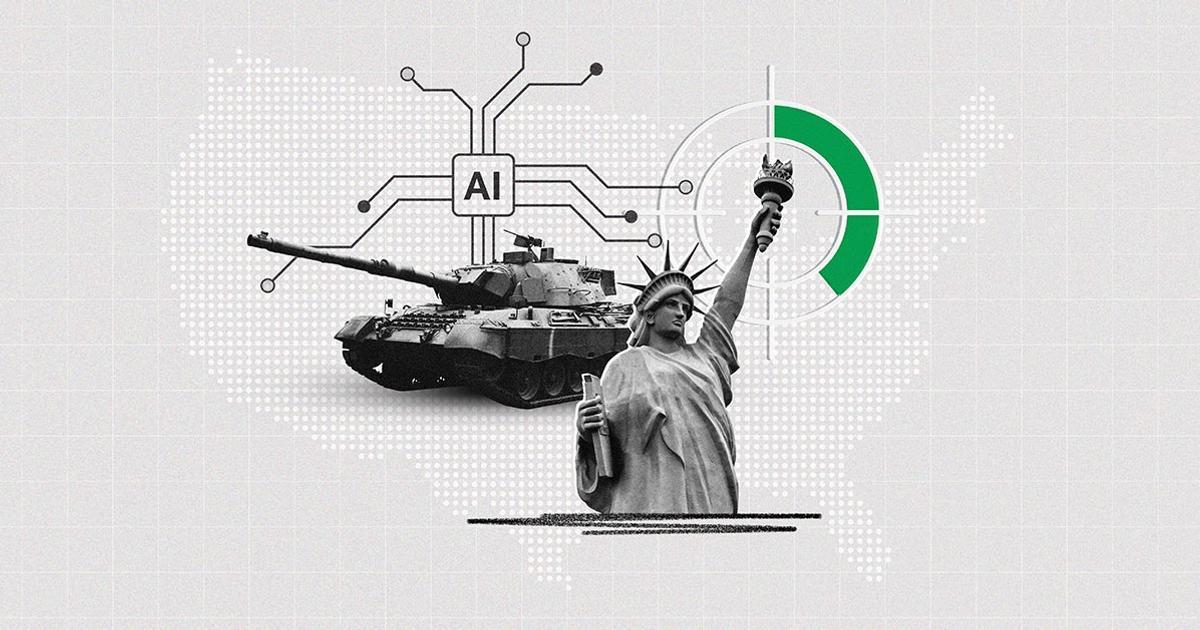Americans Express Concern Over AI's Role in National Security, Poll Reveals
2 Sources
2 Sources
[1]
American Views on AI, National Security in 5 Charts
WASHINGTON, D.C. -- Artificial intelligence has rapidly entered the public discussion in recent years and is already playing a role in U.S. national security, intelligence and defense. New research conducted by Gallup in partnership with the Special Competitive Studies Project (SCSP) outlines five key insights on how Americans view AI's role in national security and military affairs. As AI continues to develop, many questions remain over its future capabilities. Even so, 87% of Americans say it is at least somewhat likely that foreign governments will use AI to attack the U.S. within the next two decades, including 43% who say this is very likely. Americans are split on whether advancing AI technology will make national security risks better (37%) or worse (41%). Fifteen percent think AI will have a neutral impact on U.S. national security, while 8% don't know. Americans are also largely divided on AI's potential impact on the environment. Public opinion is more positive than negative toward AI's impact on scientific research and the national economy, with more Americans saying the technology will make the U.S. better than worse in both areas. This includes a majority of 61% who say AI will make U.S. scientific research better. Views about what AI will mean for U.S. national security vary significantly by demographics. Adults younger than 40, women, Democrats and non-users are more likely to say AI will make national security risks worse, while those aged 65 and older, men, Republicans, and AI users are more optimistic. The divide is particularly sharp between 18- to 29-year-olds and those aged 65 and older. Americans hold divided views on the U.S. developing AI-enabled autonomous weapons for use in military conflicts with other countries. The survey finds that 48% of Americans either somewhat or strongly oppose their development, while 39% support it. However, public opinion shifts when Americans are asked to consider other nations' developing these weapons first. In that scenario, 53% support the U.S. developing them, while 32% are opposed. Similar to views about AI making national security risks better or worse, older adults, men and Republicans are more likely than younger adults, women and Democrats to support the use of AI-enabled weapons. The survey also asked Americans whether they think AI will improve or reduce the quality of five different areas of military operations. There is significant uncertainty over each area, with between 20% and 32% saying they do not know. Yet, more people think AI will mostly improve rather than mostly reduce the ability to detect military threats, the quality of intelligence analyses, and the safe and efficient use of military weapons. This suggests some degree of openness to AI-enhanced military technology. However, Americans are more split on whether AI will improve or reduce the quality of U.S. military strategy and the selection of military personnel. Americans view foreign AI threats as a real possibility, with four in 10 saying AI-enabled attacks from foreign governments are very likely to occur within the next two decades and another 44% saying these are somewhat likely to occur. This belief is broadly shared across different demographic groups, unlike opinions on whether AI will make U.S. national security risks better or worse, with men, Republicans and older adults more likely to predict improvement. Meanwhile, support for the U.S. military developing AI-enabled weapons is conditional on other nations' developing them first. Still, many Americans see promise in AI's potential to improve military threat detection, intelligence analyses and operational safety.
[2]
Almost 9 in 10 say foreign governments will likely use AI to attack US: Poll
Nearly nine in 10 Americans said they think foreign governments will use artificial intelligence (AI) to attack the U.S. in the next two decades, according to a new Gallup poll. Some 87 percent of U.S. adults said it is somewhat or very likely that the technology will be used to target the country, the Monday poll found. Despite this, Americans have mixed views on what AI means for national security, with 41 percent saying the technology will leave the county worse off, while another 37 percent believe it will be better for national security. Older adults skew more positive, with half of those 65 and up saying U.S. national security would be better off with AI, according to the poll. Those between the ages of 40 and 64 are less optimistic. Some 42 percent said the U.S. would be worse off, while 37 percent were of the opposite mindset. The youngest age groups were the most critical of the technology, with 46 percent of both 18- to 29-year-olds and 30- to 39-year-olds saying it would be worse for national security. Just 26 percent and 30 percent of those two segments, respectively, said it would be better off. Women, Democrats and non-AI users were also more likely to rate its impact negatively. Forty-four percent of women in the Gallup poll said U.S. national security would be worse off, as did 48 percent of Democrats and 44 percent of those who do not use the technology. When it comes to the U.S. military's use of AI weapons, Americans across the board are slightly more skeptical. Some 48 percent said they somewhat or strongly oppose the development of AI-enabled autonomous weapons, while 39 percent said they support it to varying degrees. However, this dynamic shifts if other countries develop such weapons first, in which case 53 percent back U.S. development. In other use cases, Americans are more likely to believe AI will be helpful for the military, with 41 percent saying it will mostly improve the ability to detect targets, 38 percent saying it will boost the quality of intelligence analyses and 33 percent saying it will help with the safe and efficient use of weapons. U.S. adults just barely skew positive on whether AI will improve the quality of the country's military strategy. Some 28 percent said it would, while 25 percent said it would reduce the quality. Just under a quarter of Americans said AI would do both equally, while another quarter answered that they didn't know. This last option was the most popular answer on how AI would impact the quality of military personnel, with 32 percent saying they were unsure. President Trump has pushed for the U.S. military to speed up its adoption of AI, calling for the country to "aggressively adopt AI within its Armed Forces" in his AI Action Plan. Several major AI companies, including Anthropic, Google, OpenAI and xAI, received contracts with the Defense Department for up to $200 million in July to boost the agency's use of the technology. The Gallup poll was conducted between April 25 and May 5 with 3,128 U.S. adults and had a margin of error of 2.1 percentage points.
Share
Share
Copy Link
A recent Gallup poll shows that while Americans are apprehensive about AI's potential threats to national security, they also see benefits in its military applications. The survey reveals mixed opinions on AI's impact across different demographic groups.

Americans Wary of AI's Potential Threats to National Security
A recent Gallup poll, conducted in partnership with the Special Competitive Studies Project (SCSP), has shed light on Americans' views regarding artificial intelligence (AI) and its role in national security. The survey, which sampled 3,128 U.S. adults between April 25 and May 5, reveals a complex landscape of opinions on AI's potential impact on military affairs and national defense
1
.Widespread Concern Over Foreign AI Threats
An overwhelming majority of Americans (87%) believe it is at least somewhat likely that foreign governments will use AI to attack the United States within the next two decades. This concern is particularly acute, with 43% of respondents considering such attacks very likely
1
. This apprehension appears to be broadly shared across various demographic groups, indicating a widespread recognition of AI's potential as a national security threat2
.Mixed Views on AI's Impact on National Security
Despite the consensus on potential threats, Americans are divided on whether AI advancements will ultimately improve or worsen national security risks. The poll found that 41% believe AI will exacerbate security challenges, while 37% think it will lead to improvements. Interestingly, 15% anticipate a neutral impact, and 8% are uncertain
1
.Demographic Disparities in AI Perception
The survey revealed significant variations in opinions across different demographic groups. Younger adults (under 40), women, Democrats, and non-AI users tend to be more pessimistic about AI's impact on national security. In contrast, older adults (65 and above), men, Republicans, and AI users generally express more optimistic views
1
2
.AI-Enabled Weapons: A Conditional Acceptance
Public opinion on the development of AI-enabled autonomous weapons for military use is nuanced. Initially, 48% of Americans oppose their development, while 39% support it. However, this stance shifts significantly when considering the possibility of other nations developing such weapons first. In this scenario, support for U.S. development of AI-enabled weapons rises to 53%, with opposition dropping to 32%
1
2
.Related Stories
Perceived Benefits in Military Applications
Despite concerns, Americans see potential benefits in AI's military applications. The survey indicates that more respondents believe AI will improve rather than reduce the military's ability to detect threats, enhance intelligence analyses, and ensure the safe and efficient use of weapons. However, opinions are more divided on AI's potential to improve military strategy and personnel selection
1
2
.Government and Industry Response
In light of these findings, it's worth noting that the U.S. government is actively pursuing AI integration in military operations. President Trump has called for aggressive AI adoption within the Armed Forces, and several major AI companies, including Anthropic, Google, OpenAI, and xAI, have received contracts worth up to $200 million from the Defense Department to enhance the agency's AI capabilities
2
.References
Summarized by
Navi
Related Stories
Recent Highlights
1
Google Gemini 3.1 Pro doubles reasoning score, beats rivals in key AI benchmarks
Technology

2
Meta strikes up to $100 billion AI chips deal with AMD, could acquire 10% stake in chipmaker
Technology

3
Pentagon threatens Anthropic with supply chain risk label over AI safeguards for military use
Policy and Regulation








